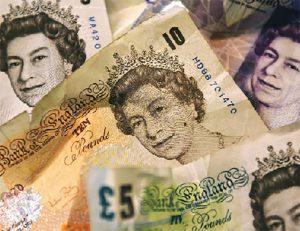BLOOMBERG
The pound weakened and global bonds rallied after inflation in Britain slowed more than expected, reviving speculation about how many more times the Bank of England (BOE) will increase interest rates. Stocks in the UK and Europe advanced.
The UK Consumer Prices Index was 7.9% higher than a year ago in June, a sharp drop from the 8.7% reading in May. It was the first downward surprise in five months and the biggest since July 2021, below the 8.2% expected by economists. The pound slid as much as 0.9% against the dollar, winding back recent gains, as traders pared bets on further BOE rate hikes. The yield on two-year UK government bonds plunged by more than 20 basis points, set for the sharpest drop since March. Treasury yields retreated across the curve. A gauge of dollar strength rose.
Rate-sensitive real estate stocks led gains in Europe’s Stoxx 600 index, with UK homebuilders surging the most since 2008 on optimism about less-aggressive hikes. “The strength in the pound was due to higher inflation pushing rates expectations up and growth expectations down,†said Barclays strategist Emmanuel Cau. “So today’s weaker-than-expected inflation print is arguably a relief, which should lift sentiment on the depressed domestic plays and rates plays. Investors are very bearish on the UK and under-exposed, so short covering may be powerful.â€
Kering SA soared after the luxury group announced the departure of the head of the Gucci brand. Aston Martin Lagonda Global Holdings Plc rallied after Goldman Sachs Group Inc analysts upgraded the UK carmaker.
US futures were flat after Wall Street stocks closed near session highs, as results from Bank of America Corp and Morgan Stanley bolstered bank shares and a rally in equities linked to artificial intelligence resumed.
Elsewhere on the monetary policy front, euro-area underlying inflation, the key measure of price gains for the European Central Bank, accelerated more than initially reported in June, cementing the interest-rate increase expected next week.
In Asia, shares in Hong Kong and mainland China were the worst performers. The offshore yuan also fell to the weakest level in more than a week. Investors see no easy fix to China’s economic slump, with fresh signs of financial stress among the nation’s dollar-bond issuers.
The yen weakened for a second day following Bank of Japan Governor Kazuo Ueda’s comment that it would maintain monetary easing unless there is a shift in its price goal view.
The Stoxx Europe 600 rose 0.4% in London. S&P 500 futures were little changed. Nasdaq 100 futures were little changed. Futures on the Dow Jones Industrial Average rose 0.2%. The MSCI Asia Pacific Index was little changed. The MSCI Emerging Markets Index fell 0.3%.
The Bloomberg Dollar Spot Index rose 0.2%. The euro was little changed at $1.1235. The Japanese yen fell 0.7% to 139.74 per dollar. The offshore yuan fell 0.5% to 7.2285 per dollar. The British pound fell 0.8% to $1.2938. Bitcoin rose 0.6% to $29,950.61. Ether rose 0.7% to $1,907.4.
The yield on 10-year Treasuries declined three basis points to 3.75%. Germany’s 10-year yield declined five basis points to 2.34%. Britain’s 10-year yield declined 17 basis points to 4.16%. Brent crude rose 0.7% to $80.18 a barrel.
 The Gulf Time Newspaper One of the finest business newspapers in the UAE brought to you by our professional writers and editors.
The Gulf Time Newspaper One of the finest business newspapers in the UAE brought to you by our professional writers and editors.
